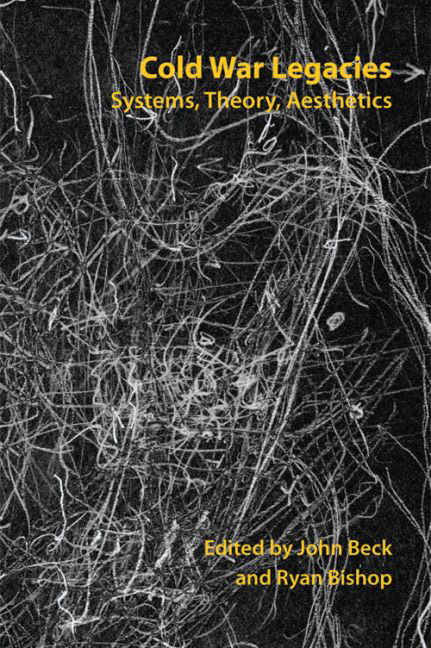Book contents
- Frontmatter
- Contents
- List of Figures
- Series Editors’ Preface
- Acknowledgements
- Notes on Contributors
- Introduction: The Long Cold War
- I PATTERN RECOGNITION
- II THE PERSISTENCE OF THE NUCLEAR
- 4 The Meaning of Monte Bello
- 5 Deep Geological Disposal and Radioactive Time: Beckett, Bowen, Nirex and Onkalo
- 6 Shifting the Nuclear Imaginary: Art and the Flight from Nuclear Modernity
- 7 Alchemical Transformations? Fictions of the Nuclear State after 1989
- III UBIQUITOUS SURVEILLANCE
- IV PERVASIVE MEDIATIONS
- Index
7 - Alchemical Transformations? Fictions of the Nuclear State after 1989
from II - THE PERSISTENCE OF THE NUCLEAR
Published online by Cambridge University Press: 10 May 2017
- Frontmatter
- Contents
- List of Figures
- Series Editors’ Preface
- Acknowledgements
- Notes on Contributors
- Introduction: The Long Cold War
- I PATTERN RECOGNITION
- II THE PERSISTENCE OF THE NUCLEAR
- 4 The Meaning of Monte Bello
- 5 Deep Geological Disposal and Radioactive Time: Beckett, Bowen, Nirex and Onkalo
- 6 Shifting the Nuclear Imaginary: Art and the Flight from Nuclear Modernity
- 7 Alchemical Transformations? Fictions of the Nuclear State after 1989
- III UBIQUITOUS SURVEILLANCE
- IV PERVASIVE MEDIATIONS
- Index
Summary
You can't make this shit up
James L. Acord, epigraph to James Flint's The Book of AshJames Flint's The Book of Ash(2004) opens with a postal problem: Cooper James is a twenty-something, civilian computer programmer employed by the US military at Featherbrooks, an RAF outpost in North Yorkshire (based, presumably, on the real-world Fylingdales Radar Installation), which carries out either electronic surveillance or nuclear missile defence (Cooper cannot tell us what his job is, because he simply doesn't know himself – he is a cog in the machine). Cooper is an unhappy and sexually frustrated nerd whose main hobby is his elaborate audiophile stereo system, and is someone who seems to have a thoroughgoingly ironic relationship to his employment, noting that whenever he speaks off-base to a fellow employee with a higher security clearance, she has to fill out a security form, and he imagines the file ‘groaning with conversations we've had about ERand The X-Files. (Especially The X-Files)’ (Flint 2004: 9). So there is a kind of world-weariness here about the national security state: it still exists, but it is now recording idle banter about X-Filesplots – banter about a conspiratorial version of itself – as much as it is protecting us from terrorists after 9/11. During an ordinary work day Cooper's office is suddenly evacuated, and he dutifully shuffles off with the rest of the employees. To his surprise he is called back in to see the director of base security, and interrogated about a mysterious parcel, addressed to him, that has just arrived on the base. At a time of dirty bomb threats and anthrax scares, the military is hardly in the mood for pranks, and Cooper is given the third degree.
By the end of the first chapter we've come to learn that this canister contains nothing more than what looks like ‘some kind of dust’ (15). Dust, of course, is always the residue of something else, and this detritus is supposedly physical remains, the ashes of Cooper's long-absent father, the artist Jack Reever. The novel's problem of mysterious postage – what has come through the mail –is thus also a problem of post-ness in another, male, sense, since Cooper hasn't seen his father in twenty years after Jack Reever walked out of his life and moved back to the United States.
- Type
- Chapter
- Information
- Cold War LegaciesLegacy, Theory, Aesthetics, pp. 134 - 148Publisher: Edinburgh University PressPrint publication year: 2016



